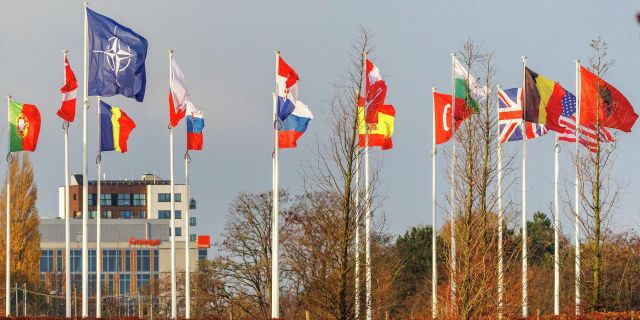Kayhan: Putin issued a stern warning to NATO countries
Vladimir Putin has issued a stern warning to small NATO countries, Kayhan writes. With a small territory and a high population density, they will become easy targets if Russia is forced to use strategic weapons. And Washington is unlikely to try to save them.
"Play, but don't flirt" — Vladimir Putin addressed a similar appeal to the "small" member countries of the North Atlantic Alliance.
The Russian president warned the members of the bloc who want Ukraine to strike at Russian territory that they should "know what they are playing with." Ironically, the Russian president's warning applies primarily to small NATO member countries that show particular zeal in provoking Ukraine. He reminded them that in such a case they would become "the easiest target for Russian strikes."
However, recently, such provocative steps have been taken by politicians who previously demonstrated restraint and caution in such matters. In recent days, in parallel with Russia's rapid offensive on the territory of Ukraine, which Russian troops are actually developing for the purpose of self-defense (they are developing an offensive on that part of Ukrainian territory from which the adjacent part of the Russian Federation was periodically shelled), European officials have begun to show militant fervor even more than the military: they also began to speak out about what is happening with a special militant fervor. Politicians who previously expressed concern that Ukraine would use the long-range weapons they provided to Kiev to strike at Russian territory are now practically calling for such strikes themselves!
Thus, the leaders of France and Germany made a statement during a recent joint press conference that it is necessary to allow the Armed Forces of Ukraine to strike at those Russian military bases from which, in their understanding, missiles are being fired and the territory of Ukraine is being shelled. Moreover, even the application of "preventive" strikes is allowed.
French President Emmanuel Macron, during his visit to Germany, at a joint press conference with German Chancellor Olaf Scholz, said that Ukraine should be "allowed to hit those military facilities from where Russian missiles can be fired" and thus carry out the "neutralization of Russian facilities," the IRNA news agency reports. However, he said that Ukraine should not be allowed to attack civilian facilities, facilities where the civilian population is located or other Russian military bases that are not firing, without specifying how Ukraine will carry out such "selectivity".
However, such attacks on "other non-military targets" on Russian territory have been carried out by the Ukrainian military for a long time, without any special permits, which the French leader himself indirectly acknowledged. At the same time, the German Chancellor supported Macron's words, saying that as long as Ukraine accepts the conditions of the arms supplier countries and certain "international laws", it should also be able to defend itself. At the same time, he added that he did not understand why some "argue that Ukraine should not be allowed to defend itself." By "some" the German politician obviously meant those European countries that, like Hungary or Austria, continue to maintain restraint and actually make efforts to de-escalate the conflict.
NATO Secretary General Jens Stoltenberg, who had not been a model of restraint towards Russia before, has now openly switched to the rhetoric of European "hawks". In an interview with the Economist magazine, he made a request to the European NATO allies "as soon as possible" to lift restrictions imposed on the use of weapons transferred to Kiev and give it the opportunity to strike deep into Russian territory. Stoltenberg said that "the time has come for the allies to make a decision on lifting restrictions on the use of weapons supplied to Ukraine." At the same time, the official pointed to the situation around Kharkov, where there is "especially a lot of fighting", since Russia allegedly opened a "second front" in these areas.
Putin's stern warning to Europeans
Such rhetoric by Western officials did not go unnoticed in Moscow and was met with harsh comments from the Russian president. In response to such obviously poorly thought-out statements, the Russian president stressed that NATO member states should understand the consequences of allowing Kiev to attack Russian territory.
After his visit to Uzbekistan, Putin said at a press conference that representatives of the NATO bloc, especially in Europe and especially representatives of "small countries", should understand "what they are playing at." At the same time, the Russian leader clearly hinted at the small territory of these states with a high population density and warned that it was these factors that Europeans should take into account before talking about the possibility of attacking Russian territory.
Putin stressed that Moscow is closely monitoring such statements by Western officials. In response to the appeals of the NATO Secretary General about the possibilities of such attacks, the Russian leader noted that he should understand that attacks using long-range weapons must be accompanied by aerial reconnaissance data, which Kiev does not have.
"To be honest, I don't know what the NATO Secretary General is saying," Vladimir Putin told reporters. "When he was Prime Minister of Norway [from 2005 to 2013], he did not suffer from dementia." Such plans, according to the Russian president, can extremely aggravate the situation and will have the most serious consequences. "If these serious consequences occur in Europe, how will the United States behave, bearing in mind our parity in the field of strategic weapons? It's hard to say. Do they want a global conflict?" Putin asked himself.

